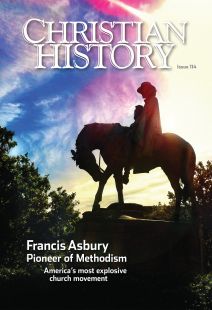“My chains fell off”: Richard Allen and Francis Asbury
RICHARD ALLEN (1760–1831) first saw the light of day as “Negro Richard,” a slave to Benjamin Chew, attorney general of Pennsylvania and owner of a thousand-acre farm. Early in childhood Richard and his whole family were sold to plantation owner Stokeley Sturgis. Sturgis was, Richard later wrote, “what the world called a good master.” He treated his slaves well and allowed them to attend Methodist preaching, but he also sold off part of Richard’s family when he got into debt.
At the age of 17, Richard was converted in classic Methodist style: “I cried to the Lord both day and night. . . . All of a sudden my dungeon shook, my chains flew off, and, glory to God, I cried.” He convinced his master to allow Methodists (including Francis Asbury) to preach in the Sturgis home. Sturgis, soon converted by famous white Methodist Freeborn Garrettson (1752–1827), decided to free his slaves. He allowed Richard to work to purchase his freedom.
Free, Richard took the surname “Allen” and began a career as a traveling Methodist preacher. Working also as a sawyer and a wagon driver, and walking everywhere, he traveled through South Carolina, New York, Maryland, Delaware, and Pennsylvania. In 1784 he attended the founding conference of the MEC in Baltimore along with Harry Hosier, Asbury’s traveling companion (see “Preachers, fighters, and crusaders,” pp. 35–38). The only two African Americans in attendance, they were not allowed to vote. Asbury asked Allen if he would travel with him, but said he had to sleep separately when they traveled through the South. Allen refused.
In 1786 Allen ended up at St. George’s, a Methodist society in Philadelphia. Church leadership restricted him to preaching only at 5:00 a.m. to African Americans. But Allen and his friend Absalom Jones (who would one day be America’s first black Episcopal priest) formed a Free African Society and kept preaching and praying.
White leaders, feeling crowded out, built a gallery for their black members. But one day a white trustee, still unhappy, pulled Jones up off his knees and said, “You must not kneel here.” When Jones refused to stand, white members began pulling all of the African American worshipers to their feet. “We all went out of the church in a body,” Allen wrote, “and they were no more plagued with us in that church.”
Allen and Jones broke ground on a new church in 1793 against white opposition, and it soon chose to become Anglican. Allen, who wanted to remain Methodist, began a new society: “The Methodists were the first people that brought glad tidings to the colored people. I feel thankful I ever heard a Methodist preach.”
Asbury helped Allen out behind the scenes, removing some white leaders who had opposed him and Jones and installing Garrettson in their place. He also preached the dedication sermon for Allen’s church, “Mother Bethel,” in 1794 and ordained Allen the first black deacon in the MEC in 1799 (though he told no one and failed to record it in his journal as he did white preachers’ ordinations).
Still subject to white leaders in Philadelphia, Allen fought for over 15 years for control of the building. Finally, in 1816—the same year Asbury died—courts ruled that “Mother Bethel” belonged to the African American group, marking the beginning of the African Methodist Episcopal Church (AME). Allen concluded his autobiographical narrative with these words:
“The God of Bethel heard her cries,
He let his power be seen;
He stopped the proud oppressor’s frown,
And proved himself a King.”
By Jennifer Woodruff Tait
[Christian History originally published this article in Christian History Issue #114 in 2015]
Next articles
Christian History Timeline: Methodists on the move
How Methodism transformed in America from a small immigrant sect to a leading Protestant denomination
the editorsA new kind of Methodism and a new kind of bishop
Matthew Simpson’s journey began very much like Asbury’s, but it did not end that way
Scott KiskerFrom John Wesley to Ben-Hur
Methodism’s continent-wide conflagration spread through pages printed by these publishing pioneers
Candy Gunther BrownThe Damnation of Theron Ware
A Methodist pastor who falls prey to the world, the flesh, and the devil
Harold FredericSupport us
Christian History Institute (CHI) is a non-profit Pennsylvania corporation founded in 1982. Your donations support the continuation of this ministry
Donate



